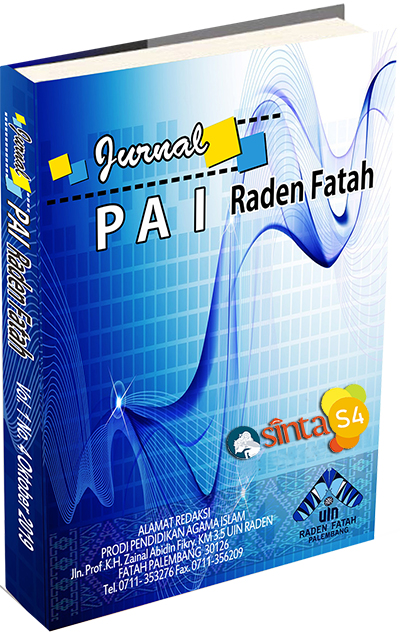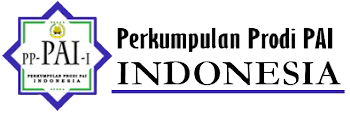Peranan Guru PAI dalam Menanamkan Etika Berpakaian pada Siswi
DOI:
https://doi.org/10.19109/pairf.v7i3.27203Keywords:
Role of Islamic Religious Education Teachers, Dress EthicsAbstract
This study is entitled the role of Islamic Religious Education teachers in instilling dress ethics to female .This study focuses on two problem formulations, namely how the dress ethics of female students and how the role of Islamic Religious Education teachers in instilling dress ethics to female students. The purpose of this study was to determine the dress ethics of female students and analyze the role of Islamic Religious Education teachers in instilling dress ethics to female students This study uses field research with a descriptive qualitative approach. Data collection techniques through observation, interviews, and documentation. Research informants consisted of Islamic Religious Education teachers and female students Data analysis techniques were carried out through reduction, data presentation, and drawing conclusions. The results of the study showed that the dress ethics of female students were quite good, with most female students covering their genitals, wearing neat and clean clothes, and not disturbing others. The role of Islamic Religious Education teachers as educators, advisors, and role models is very large in instilling dress ethics through checking uniforms, advice, and real examples. The disciplined and authoritative personality of teachers supports the success of coaching. The positive impact of this ethical dress coaching is seen in the increasing awareness of female students to maintain polite and neat clothing. Collaboration between teachers, schools, and female students is very important to strengthen the culture of dressing according to religious values in schools.
References
Ahmad Tafsir. Strategi Meningkatkan Mutu Pendidikan Agama Islam Di Sekolah. Bandung: Maestro, 2008.
Alifuddin, Muhammad. “Etika Berbusana Dalam Perspektif Islam Etika Berbusana Dalam Perspektif Agama Dan Budaya.” Jurnal Shautut Tarbiyah 1, no. 1 (2014): 80–89.
Almadadha, R. “Blockchain and Financial Performance: Empirical Evidence from Major Australian Banks.” Frontiers in Blockchain, 2025. https://www.frontiersin.org/journals/blockchain/articles/10.3389/fbloc.2025.1463633/full.
Amin Samsul Munir. Ilmu AKhlak. Jakarta: Sinar Grafika Offsect, 2016.
Auliya, Afika Tisa, Alimron Alimron, and Mardeli Mardeli. “Faktor-Faktor Yang Mempengaruhi Masalah Belajar Terhadap Hasil Belajar Siswa Di Smp Negeri 20 Palembang.” Jurnal PAI Raden Fatah 3, no. 3 (2021): 219–33. https://doi.org/10.19109/pairf.v3i3.7046.
Baldi Anggara dan Andi M. Darlis. Pengembangan Profesi Guru. Palembang: Noer Fikri, 2019.
“Decentralized Finance: A Comparative Bibliometric Analysis in the Scopus and WoS Databases.” Future Business Journal, 2024. https://link.springer.com/article/10.1186/s43093-024-00380-y.
Dedy Mulyana. Metodologi Penelitian Kualitatif (Paragdima Baru Ilmu Komunikasi Dan Ilmu Sosial Lainnya). Bandung: Remaja Rosdakarya, 2004.
Feny Rita Fiantika. Metodologi Penelitian Kualitatif. Padang: PT. Global Eksekutif Teknologi, 2022.
Firmansyah, Firmansyah. “Tinjauan Filosofis Tujuan Pendidikan Islam.” TA’LIM : Jurnal Studi Pendidikan Islam 5, no. 1 (2022): 47–63. https://doi.org/10.52166/talim.v5i1.2857.
Fransiska. “Peran Guru PAI Terhadap Etika Berpakaian Sesuai Syari’at Islam Terhadap Siswa SDN 17 Lebong.” Jurnal Pendidikan Profesi Guru Agama Islam 2, no. 5 (2022): 379–82.
Hardani. Metode Penelitian Kualitatif Dan Kuantitatif. Yogyakarta: CV. Pustaka Ilmu Group Yogyakarta, 2020.
Herbke, Patrick, Sid Lamichhane, Kaustabh Barman, Sanjeet Raj Pandey, Axel Küpper, Andreas Abraham, and Markus Sabadello. “DIDChain: Advancing Supply Chain Data Management with Decentralized Identifiers and Blockchain.” ArXiv Preprint ArXiv:2406.11356, 2024. https://arxiv.org/abs/2406.11356.
Irawan, Dodi. “Pendidikan Agama Islam Dalam Menciptakan Kepribadian Yang Baik Di Keluarga Dan Masyarakat.” Jurnal Intelektualita: Keislaman, Sosial Dan Sains 11, no. 2 (2022): 222–31. https://doi.org/10.19109/intelektualita.v11i2.14664.
Khairiyah, Muliatul, Deswalantri Deswalantri, Jasmienti Jasmienti, and Alimir Alimir. “Penerapan Etika Berbusana Muslimah Pada Siswi Kelas VIII SMPN 1 Danau Kembar Kabupaten Solok.” Indonesian Research Journal On Education 3, no. 1 (2022): 389–95. https://doi.org/10.31004/irje.v3i1.230.
Lexy J. Moelong. Metodologi Penelitian Kualitatif. Bandung: PT. Remaja Rosdakarya, 2014.
Mohammed, M A, C De-Pablos-Heredero, and J L M Botella. “Mapping the Transformative Realm of Blockchain-Enabled Central Bank Digital Currencies: A Bibliometric Analysis.” Eurasian Economic Review, 2025. https://link.springer.com/article/10.1007/s40822-024-00307-6.
Muliati, Muliati, Muhammad Rizal Masdul, Adhriansyah A. Lasawali, and Rina Purnamawaty. “Urgensi Pembelajaran Akidah Akhlak Dalam Menumbuhkan Minat Berbusana Muslimah Di Luar Sekolah Siswi MTS Al Khairaat Palapi.” Iqra: Jurnal Ilmu Kependidikan Dan Keislaman 15, no. 2 (2021): 70–78. https://doi.org/10.56338/iqra.v15i2.1574.
Mulyasa. Menjadi Guru Profesional Menciptakan Pembelajaran Kreatif Dan Menyenangkan. Bandung: PT. Remaja Rosdakarya, 2013.
Rahmawati, Titik, and Agus Khunaifi. “ETIKA BERPAKAIAN DALAM ISLAM (Studi Tematik Akhlak Berpakaian Pada Kitab Shahih Bukhori).” Jurnal Inspirasi 3, no. 1 (2019): 55–80.
Saputra, Ade Akhmad, Lia Efriliyanti, Alihan Satera, and Aulia Hakim. “Peran Manajemen Pendidikan Dalam Peningkatan Kualitas Pembelajaran Pada Madrasah Tsanawiyah Negeri 1 Palembang.” Edugama: Jurnal Kependidikan Dan Sosial Keagamaan 08, no. 02 (2022): 371–85. https://doi.org/10.32923/edugama.v8i2.2967.
Shilpy, A. Etika Profesi Guru. Yogyakarta: CV Budi Utama, 2020.
Sirajuddin Saleh. Analisis Data Kualitatif. Bandung: Pustaka Ramadhan, 2017.
Soraya, Nyayu. “Lembaga Pendidikan Islam Periode Awal Dalam Perspektif Sejarah.” Tadrib: Jurnal Pendidikan Agama Islam 2, no. 2 (2016): 251–61.
“Supply Chain Flexibility and Post-Pandemic Resilience.” Global Journal of Flexible Systems Management, 2024. https://link.springer.com/article/10.1007/s40171-024-00375-2.
Syarnubi, Syarnubi. “Profesionalisme Guru Pendidikan Agama Islam Dalam Membentuk Religiusitas Siswa Kelas IV Di SDN 2 Pengarayan.” Ta’dib: Jurnal Pendidikan Agama Islam 5, no. 1 (2019): 88.
Zhou, X, and others. “Study on the Role of Blockchain Technology in Supply Chain Carbon Emission Transparency Enhancement and Financial Regulation.” Applied Mathematics and Nonlinear Sciences 10 (2025). https://sciendo.com/article/10.2478/amns-2025-0013.












.png)


1.png)



